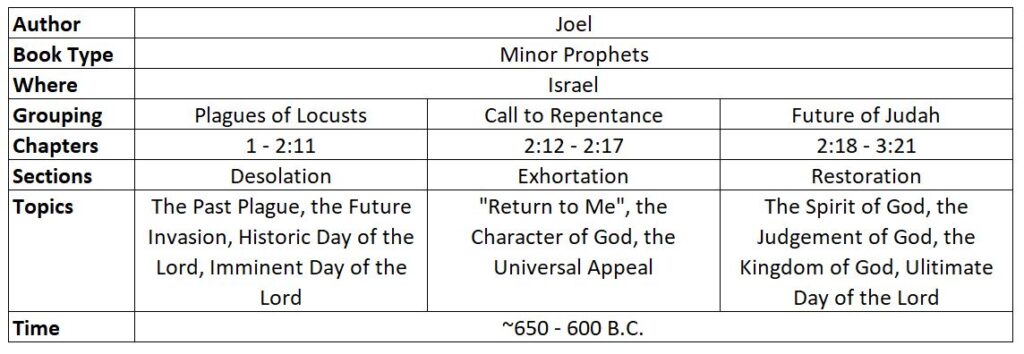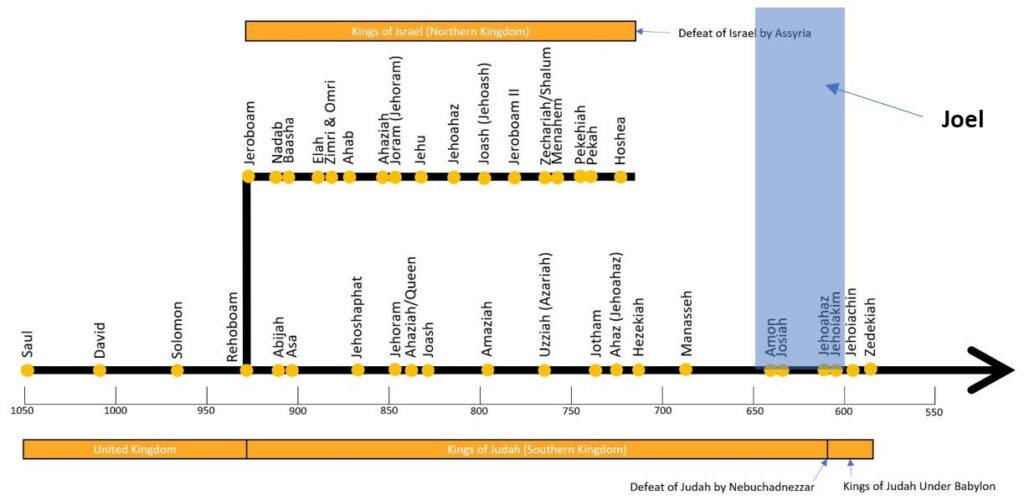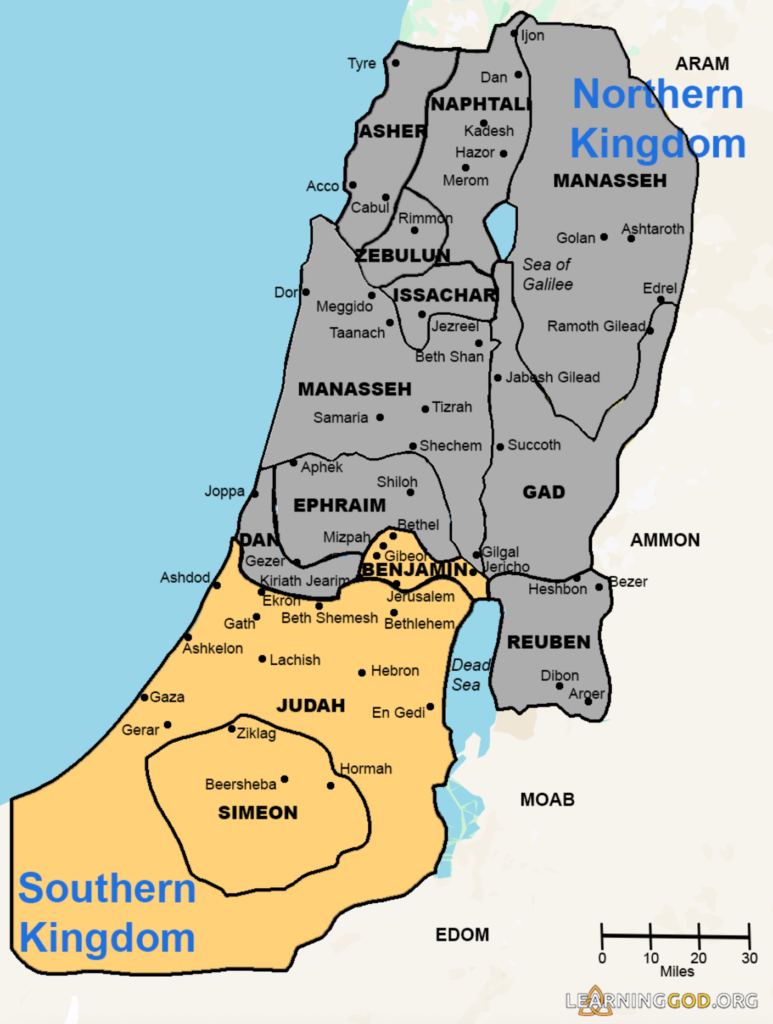Joel
A Call to Repentance
Summary | About | Why You Should Read it | Author | When Written | Context | Timeline | Location | Outline | Observations | Resources
Summary
The Book of Joel is a short prophetic text in the Old Testament, consisting of three chapters. It primarily focuses on themes of divine judgment and restoration. Here’s a high-level summary:
Judgment and the Day of the Lord (Joel 1-2):
Locust Plague as Judgment: Joel begins by describing a devastating locust plague that has ravaged the land of Judah. This natural disaster is interpreted as a sign of God’s judgment on the people for their sins.
Call to Repentance: The prophet urges the people to repent, fasting and seeking God’s mercy to avert further calamity. Joel emphasizes the importance of returning to God with sincerity, not just outward ritual.
The Day of the Lord: A central theme in Joel is “the Day of the Lord,” a future time of divine intervention when God will judge not only Israel but all nations. It is depicted as a time of both darkness and salvation.
Promise of Restoration and Renewal (Joel 2-3):
God’s Mercy and Blessing: After calling for repentance, Joel shifts to a message of hope. He promises that if the people return to God, He will restore the land, bringing an end to the plague and blessing the nation with prosperity.
Outpouring of the Spirit: Joel prophesies a future outpouring of God’s Spirit on all people, regardless of age, gender, or status. This passage is famously quoted in the New Testament in the Book of Acts, where it is linked to the coming of the Holy Spirit at Pentecost.
Judgment on the Nations: In the final chapter, Joel foretells a future time when God will judge the nations that have oppressed Israel, leading to their defeat. Meanwhile, Israel will experience divine protection and blessing.
Overall, Joel’s message combines warnings of divine judgment with promises of spiritual renewal and future blessings for those who turn to God. The book emphasizes the sovereignty of God over history and His desire for His people to repent and be restored.
The following table provides a high-level look at the structure and contents of the book of Joel.

About
Joel is the 29th book of the Bible and the second of the books of the Minor Prophets in the Old Testament.

Why You Should Read It
A Christian should read the Book of Joel for several important reasons, as it offers timeless spiritual lessons that resonate with the core beliefs of Christianity:
Understanding God’s Judgment and Mercy:
Joel vividly portrays God’s judgment through the metaphor of a locust plague, which serves as a reminder that God holds people accountable for their actions. However, the book equally emphasizes God’s mercy and willingness to forgive when people genuinely repent. This highlights a fundamental Christian principle: God’s desire for restoration and redemption rather than punishment.
Call to Repentance:
The call to repentance in Joel is a key message for people, who are encouraged to regularly examine their lives and return to God with sincere hearts. The message of turning away from sin and seeking God aligns with the Christian practice of repentance, which is central to spiritual growth.
The Day of the Lord:
Joel introduces “the Day of the Lord,” a concept echoed throughout both the Old and New Testaments. For people, this points to the future return of Christ and the final judgment. Reading Joel helps us reflect on this future reality, encouraging them to live faithfully in anticipation of Christ’s return.
Prophecy of the Holy Spirit:
Joel’s prophecy about the outpouring of God’s Spirit (Joel 2:28-32) is fulfilled in the New Testament at Pentecost (Acts 2). This moment is foundational for believers, marking the beginning of the Church and the empowerment of believers by the Holy Spirit. Joel’s prophecy reminds us of the ongoing presence and work of the Holy Spirit in their lives today.
Hope in Restoration:
Despite the dire warnings of judgment, Joel also conveys hope for restoration. This message of renewal is deeply connected to the Christian belief in redemption through Jesus Christ. Just as God promised to restore Judah after they repented, Christians believe that through Christ, their lives are renewed and restored.
God’s Sovereignty and Faithfulness:
Joel emphasizes God’s control over history and the nations. For Christians, this reaffirms the belief that God is sovereign over all situations and that His purposes will ultimately prevail, offering hope in times of difficulty or uncertainty.
Reading the Book of Joel can deepen a believer’s understanding of God’s character—His justice, mercy, and faithfulness—and inspire greater trust in God’s plan for both personal life and the world.
Author
The author of the Book of Joel is traditionally identified as the prophet Joel himself, although the text does not provide extensive biographical details about him. Joel is described as the “son of Pethuel” (Joel 1:1), but little else is known about his lineage or personal background. while the specific details of Joel’s life remain largely unknown, he is recognized as the prophet who conveyed God’s messages to the people of Judah, urging them toward repentance and offering hope for restoration.
When Written
The book of Joel was likely written towards the end of Joel’s prophetic mission, by 600 B.C., after the initial fall of Judah to Babylon.
Context
The Book of Joel was written in a historical and theological context that provides insight into its messages of judgment, repentance, and restoration. While the exact date and circumstances of its writing are debated, several key contextual elements are generally understood:
- Historical Context:
Uncertain Date: Scholars are divided on the exact date of Joel’s writing, as the book does not provide specific historical markers. Some suggest it was written as early as the 9th century BC (during the reign of King Joash of Judah), while others propose a post-exilic period (after 538 BC), following the Babylonian exile.
Post-Exilic Theory: If written after the exile, Joel would be addressing a returned community that had rebuilt the temple but was still facing hardship and threats. This view is supported by references to the temple rituals (Joel 1:9, 1:13-14) and the absence of any mention of a king, suggesting it could be after the monarchy had ended.
Locust Plague and Natural Disasters: A central event in the book is a devastating locust plague, which some interpret as a literal disaster and others as a symbolic reference to foreign invasions or military threats. Whether literal or metaphorical, the plague serves as a symbol of divine judgment and the urgent need for repentance.
- Religious Context:
Covenant Theology: Joel’s message is deeply rooted in the covenant relationship between God and Israel. According to the covenant, obedience to God would result in blessings, while disobedience would bring curses (Deuteronomy 28). The locust plague or the threat of foreign invasion is seen as the consequence of Israel’s failure to live according to this covenant.
Temple Worship: The presence of temple worship in Joel’s narrative suggests a context where the priestly system and sacrificial rituals were active. The prophet calls for the priests to lead the people in lamentation and fasting, indicating the centrality of religious leadership and communal repentance in addressing the nation’s crisis.
- Theological Context:
The Day of the Lord: The concept of “the Day of the Lord” is a significant theological theme in Joel. In the Old Testament, it refers to a time of divine intervention, either in judgment or deliverance. For Joel, this “day” is near, and it will bring judgment on both Israel (through the locust plague) and the nations who oppress God’s people.
Hope of Restoration: Despite the severity of judgment, Joel emphasizes God’s readiness to restore and bless His people if they genuinely repent. This reflects a key theme in the prophetic books—the cycle of judgment, repentance, and restoration.
- Social and Political Context:
Internal and External Threats: During this period, Judah likely faced both internal challenges (moral and spiritual decline) and external threats (invasion or natural disasters). Joel speaks to a community that is experiencing economic hardship due to the locust plague or foreign aggression, which has disrupted agriculture and temple worship.
Foreign Nations: Joel’s warnings are not limited to Judah. He also speaks of God’s judgment on the nations surrounding Israel, especially those who have mistreated God’s people. This reflects the broader political context of Israel’s relationship with neighboring nations.
- Literary Context:
Apocalyptic Imagery: Joel uses vivid and sometimes apocalyptic imagery to describe both the immediate crisis (locusts and drought) and future events (the Day of the Lord). This literary style is meant to provoke a sense of urgency and awe, encouraging the people to take God’s warnings seriously.
Prophetic Tradition: Joel belongs to the prophetic tradition, where the prophet acts as God’s spokesperson, calling the people back to faithfulness. Like other prophets, Joel emphasizes social justice, true worship, and the need for communal repentance.
In summary, the Book of Joel was written in a time of crisis, where the people of Judah were experiencing both natural and possibly military disasters, which the prophet interprets as divine judgment for their sins. The message addresses both the present need for repentance and the future hope of restoration, with an eschatological (end-times) focus on the Day of the Lord, when God will judge all nations and renew His people.
Timeline
The timeline below shows from the beginning of the monarchy with Saul through the start of the Exile. Joel takes place in a window of time from 650 to 600 B.C.

Location
Joel was a prophet to the Southern Kingdom in Judah.

Outline
| I. Title (1:1) |
| II. Judah Experiences a Foretaste of the Day of the Lord (1:2;2:17) |
| A. A Call to Mourning and Prayer (1:2-14) |
| B. The Announcement of the Day of the Lord (1:15;2:11) |
| C. A Call to Repentance and Prayer (2:12-17) |
| III. Judah Is Assured of Salvation in the Day of the Lord (2:18;3:21) |
| A. The Lord’s Restoration of Judah (2:18-27) |
| B. The Lord’s Renewal of His People (2:28-32) |
| C. The Coming of the Day of the Lord (ch. 3) |
| 1. The nations judged (3:1-16) |
| 2. God’s people blessed (3:17-21) |
Observations
- Joel was the son of Pethuel “Persuaded of God”).
- It is believed that he did not live far from Jerusalem.
- Joel was an early prophet of Judah.
- It is possible that Joel may have been a contemporary of Elisha in Israel.
- Joel was God’s spokesman during the reign of King Joash (835-796 B.C.).
- On the day of Pentecost following the death, burial and resurrection of Christ, the apostle Peter quotes from Joel in Acts 2:17-21
- The theme of disasters appears through the Book of Joel.
- Locusts
- Plagues
- Famine
- Raging fires
- Invading armies
- Celestial phenomena
- Joel tells the people that even though some disasters have struck, it is not too late to repent and avoid a greater disaster from God.
- Joel 2:11 – “The LORD gives voice before His army, For His camp is very great; For strong is the One who executes His word. For the day of the LORD is great and very terrible; Who can endure it? “
- Joel 2:28-29 – “Then you shall know that I am in the midst of Israel: I am the LORD your God And there is no other. My people shall never be put to shame.
- And it shall come to pass afterward That I will pour out My Spirit on all flesh; Your sons and your daughters shall prophesy, Your old men shall dream dreams, Your young men shall see visions. “
Old Testament
New Testament
Free Resources
Other Resources
- x
